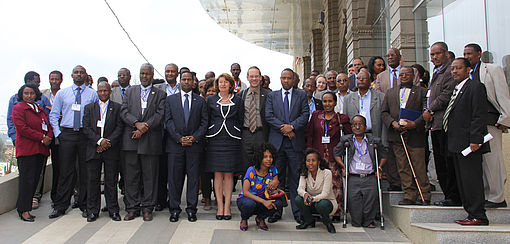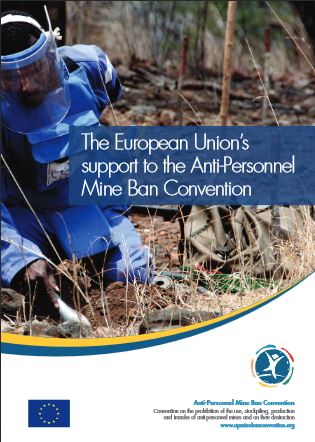EU Council Decision 2012-2014
Victim Assistance

Addis Ababa and Geneva (2013-11-13) – Ethiopia, one of 28 States Parties of the Anti-Personnel Mine Ban Convention that has reported a significant number of landmine survivors, is initiating a national process to enhance the implementation of its national disabilities plan.
During the two-day workshop in Addis Ababa, Ethiopia aims to take a major step forward towards a fully inclusive society by bringing together experts from government ministries, Ethiopia’s regional social affairs bureaus, organisations of persons with disabilities, and non-governmental and international organisations, including the International Labour Organisation and the International Committee of the Red Cross, to review Ethiopia’s National Plan of Action for Persons with Disabilities.
Both the Anti-Personnel Mine Ban Convention and the Convention on the Rights of Persons with Disabilities aspire to a world where all persons with disabilities, including landmine survivors, can participate in their societies on equal basis with others," said H.E. Abdulfetah Abdulah, Minister of the Ministry of Labour and Social Affairs of Ethiopia. "Our hope is that, through an inclusive, national process to enhance Ethiopia's disability efforts, we will move closer to that goal.
"By bringing key stakeholders together, Ethiopia will be in a better position to address the rights and needs of persons with disabilities, including landmine and other explosive remnants of war survivors, regarding comprehensive rehabilitation services, equal opportunities for education, skills training and work," said Kerry Brinkert, Director of the Convention’s Implementation Support Unit, which serves as technical advisor for the workshop.
In June next year, the international community will gather in Maputo for the Convention's Third Review Conference to assess the progress made in the implementation of the Cartagena Action Plan," said Ambassador Chantal Hebberecht, Head of EU Delegation to Ethiopia during the workshop. "By that time, it will be expected that the implementation of the Cartagena Action Plan will have brought about a substantial contribution towards ending the suffering and casualties caused by anti-personnel mines. We would therefore encourage all actors working to implement the National Action Plan to work in a focused manner and make the best possible use of existing resources.
Funding for the workshop is being provided by a European Union Council Decision intended to advance the implementation of the Convention and to further its humanitarian objectives including promoting the welfare of landmine survivors.
The European Union Council Decision will also provide funds for a global conference on effectively meeting the needs of landmine survivors in broader contexts. Entitled, Bridges between Worlds, this conference will seek to deepen understandings and find synergies among the human rights, disability, international humanitarian law and victim assistance worlds. The global conference will take place in Medellin, Colombia on 3-4 April 2014.

